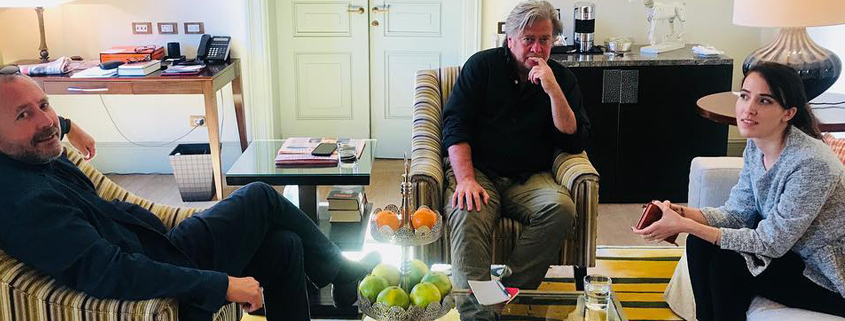This article was first published on First Things, October 10, 2018.
Is Europe’s new populist movement exclusively a rightwing phenomenon, or does it seek to unite anti-establishment forces of all stripes? This is the first question I ask Steve Bannon about his new project, The Movement, a foundation that hopes to unite populist forces across the continent. His answer is clear: “Absolutely, Italy is the best example of what we’d like to achieve.” The Movement wants to unify all anti-establishment factions and transcend the left-right dichotomy to fight the “party of Davos”—the financial, managerial, and cultural elite which has been running the Western world into the ground.
Bannon is also starting a course, along with colleague Benjamin Harnwell, to train a new generation of Catholics at the Dignitatis Humanae Institute in Rome. “The institute aims to create a political approach for Catholicism that can work with Europe’s populist and nationalist uprisings,” Harnwell tells me. A distinction must be made between the two: Populism is best represented by a party like the Five Star Movement, which promises to protect the interests of the people against unaccountable supranational organizations and multinational corporations. Nationalism is best exemplified by an anti-immigration party like the League, which promises to protect Italy’s identity from outside threats.
Francis’s papacy has been extremely hostile toward both these movements. “Today populism is trendy, but it has nothing to do with the people’s needs and values,” he told participants in the Synod on Youth. “Populism closes doors to compassion.”
Bannon thinks this is a mistake. Pope Francis is supporting the reactionary, anti-democratic forces in the party of Davos. “The elites are not handing over the keys,” he tells me. “With all due respect to the pope, he’s missing the point.” Bannon believes that the pope’s support of migration has given cover for human trafficking. “It’s outrageous what he’s doing . . . helping the people traffickers by promoting mass migration. The biggest winners of all this are the most evil people in this world.”
According to Bannon, Francis does not understand that a deeper problem underlies this crisis. The common man and woman no longer control their lives. Instead, they have become subservient to technocrats and bureaucrats who decide their fate from Brussels’ remote halls. Christianity used to be about protecting the family, but the pope’s support of mass migration helps the ruling class destroy the family’s very foundations. In Italy, families can no longer afford to have children, and the birthrate has collapsed. Both Francis and the party of Davos elites see migrants as the solution to a disease they haven’t properly diagnosed. Europeans are not having children—not because they don’t want them, but because they can no longer have them. “The Pope is radical in this regard,” Bannon says. “When he said Europe would be empty without immigration, he doesn’t realize birthrates are falling because of economic insecurity. You don’t solve that by allowing low-skilled migrants to come to a country that has a problem financing a social welfare system for its own citizens.”
“I’m not a theologian,” Bannon hastens to add. “I’m a simple Catholic who grew up in the American South. I was an altar boy from a blue-collar family.” He applauds Francis’s critique of modern capitalism. “He sees corrupt state capitalism with big government, which is literally fascism, and a bastardization of capitalism as the problem.” But he dislikes Francis’s proposed solution—aligning the Church with the liberal cultural forces that have wreaked havoc in the Western world.
Bannon believes that a traditional form of Catholicism is the best way to deal with human imperfection. “I’m divorced,” he says. “Man’s fallen, we’re not perfect. The point of the Church is helping you through these imperfections.” Like several other populist leaders who champion traditional values, including Matteo Salvini and Donald Trump, Bannon is divorced. Though he would not hold himself up as an exemplary Catholic, he sees the “dubia” that four cardinals submitted to challenge certain liberal interpretations as the best form of resistance to the progressivism pervading the Church.
Some, like French far-right leader Marine Le Pen, have distanced themselves from Bannon’s Movement. In a press conference on Monday, Le Pen said that “Bannon is not European,” adding that it was not up to an American to “save Europe.” “It is us and only us who will shape the political force resulting from European elections,” she declared.
Yet Bannon continues traveling around Europe to set up The Movement, meeting with populists from across the spectrum and focusing particularly on Italy. He has met with the head of the Five Star Movement Luigi Di Maio, the head of Brothers of Italy Giorgia Meloni, and Matteo Salvini. According to Bannon, “Italy is at the center of the political universe right now,” and exemplifies what the Western world should aim for: “A unity of forces that put common people above elites and family above markets.” Bannon believes that the Catholic Church should find much to applaud in this program.



